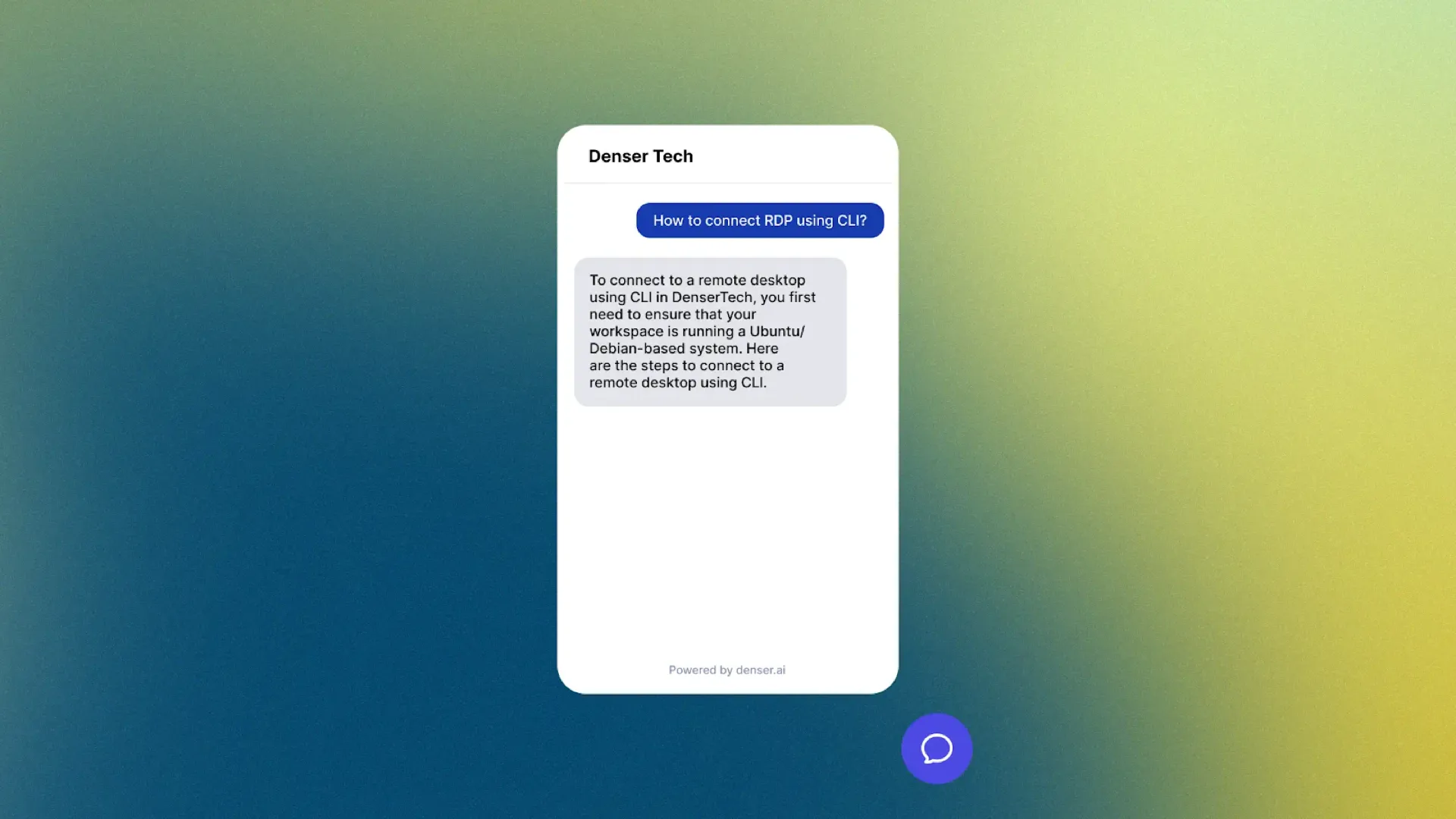
10 Best Chatbot on Website Platforms For 2026

With 62% of consumers preferring chatbots over waiting for human agents, a chatbot on website has become essential for modern businesses. In 2026, AI now powers 95% of customer interactions, and the global chatbot market has reached $11.8 billion—projected to hit $27 billion by 2030.
Customers are turning to website chatbots when looking for product recommendations, asking questions, or resolving issues. A well-implemented website chatbot provides instant responses without the wait—and businesses using them save up to 30% on customer support costs while achieving $4.13 in savings per interaction compared to human agents.
However, if your chatbot cannot provide accurate answers or engage with users, it can affect customer satisfaction and even lead potential customers to look elsewhere.
That's why choosing the right chatbot for website is key to maintaining a positive user experience. These chatbots help simplify communication, provide immediate assistance, and improve customer experience—with an 87.58% satisfaction rate for AI-powered live chat.
But with so many options available, how do you choose the best website chatbot for your business? Our AI chatbot for website solution offers advanced features designed to enhance customer support and lead generation.
In this article, we'll discuss all the essentials about chatbots on website—from key features to the most popular choices—so you can choose an AI chatbot that simplifies your website's user experience.
Quick Comparison: Best Website Chatbot Platforms 2026#
| Platform | Best For | Starting Price | Free Plan | AI Model | Key Strength |
|---|---|---|---|---|---|
| Denser.ai | Website chatbots with source citations | $29/mo | Yes | GPT-4o, Claude, Gemini | Crawls 100K+ pages, cited answers |
| Intercom | Enterprise customer support | $29/seat/mo | No | Fin AI ($0.99/resolution) | Full support suite with ticketing |
| Drift | B2B sales acceleration | $2,500/mo | No | Proprietary | Meeting booking, CRM integration |
| Tidio | Small business live chat + AI | $29/mo | Yes (50 chats) | Lyro AI ($0.50/chat) | Real-time visitor tracking |
| ChatBot.com | Visual workflow building | $65/mo | No | Custom AI model | Drag-and-drop bot builder |
| ManyChat | Social media chatbots | $15/mo | Yes (1K contacts) | AI add-on ($29/mo) | Instagram & Messenger focus |
| LivePerson | Enterprise omnichannel | $40/mo | No | Conversational Cloud | Voice + digital channels |
| Freshchat | Support teams (Freshworks users) | $19/agent/mo | Yes (10 agents) | Freddy AI | Unified agent workspace |
| Chatfuel | Facebook & Instagram bots | $20/mo | No | Built-in AI | No-code Messenger builder |
| Chatbase | Quick AI chatbot from docs | $40/mo | Yes (50 msgs/mo) | GPT-4, Claude | Train from any document |
Our pick: Denser.ai stands out as the best website chatbot for businesses that need accurate, cited answers from large content libraries. It crawls your entire website and delivers responses with source links — setup takes under 5 minutes.
What is a Chatbot on Website?#
A website chatbot is a software application designed to simulate conversations with users. It's integrated into websites to automate user interactions and provide instant support.
A chatbot on website can answer common questions, provide information, and assist with navigation—helping visitors find what they need without waiting for a human agent.

There are two main types of chatbots:
Rule-based chatbots follow a predetermined path based on user inputs. They are simple and ideal for answering FAQs or basic customer queries. However, they lack the flexibility to handle complex interactions.
AI-driven chatbots use natural language processing (NLP) and artificial intelligence to understand and respond to more complex queries from customers. They learn from interactions and get better at answering over time.
How Website Chatbots Work#
A chatbot for website relies on NLP to interpret user inputs. When a visitor asks a question, the chatbot analyzes the text, determines the intent, and generates a response.
This allows website chatbots to mimic human conversation and provide useful answers in real-time.
For example, a visitor might ask, "Do you have this product in stock?" A chatbot on website equipped with NLP will understand the question and either provide an answer or guide the visitor to the right page.
Why Does Your Business Need A Chatbot on Website?#
Having a chatbot on website can offer numerous benefits for businesses of all sizes. With chatbots automating up to 80% of routine tasks and Gartner predicting conversational AI will reduce contact center labor costs by $80 billion by 2026, they're transforming how businesses handle customer interactions.
Aside from answering customer questions, a website chatbot can create an efficient, user-friendly experience that keeps customers engaged.
Here are the key reasons why you should consider implementing a chatbot for website:
24/7 Customer Support#
A website chatbot can provide round-the-clock customer support anytime, even during weekends or holidays.
Constant availability ensures that customers can get help whenever they need it—reducing wait times and improving satisfaction.
Increased User Engagement#
Chatbots on website can initiate conversations with visitors, ask questions, and guide them through your pages.
For example, a chatbot on website might ask, "Can I help you find something today?" to encourage visitors to engage with your business rather than passively browsing.
This means visitors spend more time on your site and are more likely to convert into customers.
Lead Generation and Qualification#
A website chatbot can also serve as a powerful lead-generation tool. It can collect visitor information by asking questions like "What's your name?" or "How can we contact you?"
Additionally, chatbots on website can qualify leads by identifying their needs and directing them to the appropriate team or service.
For example, a chatbot might ask, "Are you interested in learning more about our products?"
If the visitor responds positively, the chatbot can provide a product recommendation or a special offer. This personalized interaction can greatly improve conversion rates.
Simplified Customer Journey#
A well-designed chatbot can guide customers through the entire purchasing process, from browsing products to completing a sale.
It can also answer product-related questions, provide recommendations, and assist with checkout to reduce the chances of cart abandonment.
Cost Efficiency#
Chatbots can be much more cost-effective than hiring additional customer service agents. It can handle hundreds of conversations simultaneously while maintaining high-quality customer service.
Key Features to Look for in the Best Chatbot on Website#
Choosing the best chatbot on website for your business requires a deep understanding of what features will bring the most value to your users.
While website chatbots can vary in functionality, some key features are essential to optimize your website's customer interactions and support.
Customization and Personalization#
A chatbot should be able to match your brand's voice, tone, and appearance. Personalization goes beyond basic customization.
It should also be able to create more meaningful interactions with users based on their behavior, preferences, or previous interactions with the chatbot.
AI and Machine Learning Capabilities#
Artificial intelligence (AI) and machine learning play a huge role in making website chatbots more effective.
The best chatbot on website platforms use AI to understand and respond to more complex questions, providing users with relevant, accurate information.
Over time, machine learning allows the chatbot to improve its responses based on previous conversations. The more the chatbot for website interacts with users, the smarter it becomes. Advanced AI-driven chatbots can even predict user needs based on their questions, leading to faster resolutions.
Integration with Existing Tools#
A great chatbot for website should easily integrate with your existing tools and platforms, such as a customer relationship management (CRM) system, e-commerce platforms, or helpdesk software.
A website chatbot integrated with a CRM system can provide valuable customer data in real-time, allowing businesses to tailor their responses.
Similarly, a chatbot on website connected to an e-commerce platform can assist with product searches, order status inquiries, and more.
Multilingual Support#
Nowadays, it is essential to communicate with users in their native language, and AI chatbots can effortlessly do that.
This widens your audience and improves customer satisfaction by providing clear, understandable responses.
For example, an e-commerce site selling products worldwide could have users from Spain, France, and China.
A chatbot with multilingual support could automatically detect the user's language or provide an option to switch languages.
Omni-Channel Support#
Omni-channel support in website chatbots ensures that businesses can engage with their customers across these various channels.
For example, a customer might ask a question on your website but later continue the conversation on Facebook Messenger.
With omnichannel support, the chatbot will maintain context, allowing the conversation to pick up where it left off, regardless of the platform.
Natural Language Processing (NLP)#
Natural Language Processing (NLP) is one of the most important technologies that power modern website chatbots.
With NLP, the chatbot can recognize the intent behind the query, regardless of how it's phrased, and provide the right response.
Unlike rule-based chatbots that are limited to handling specific, predefined questions, NLP-powered chatbots can tackle more complex and open-ended queries.
They can understand context, pick up on subtleties in language, and generate appropriate responses.
Analytics and Reporting Features#
Finally, the best website chatbot platforms are equipped with robust analytics and reporting tools. Our Chatbot on Website solution provides comprehensive analytics to track performance and optimize customer interactions.
These features allow businesses to track their chatbot on website performance, including metrics such as conversation success rates, response times, and user satisfaction.
10 Best Chatbot on Website Platforms#
Choosing the best chatbot on website for your business depends on your unique needs, budget, and technical requirements.
Here is a comparison of some of the top website chatbot platforms, including their key features and pricing:
1. Denser.ai#
With DenserBot, the platform's AI assistant, Denser.ai automates website responses and tasks to save you time and improve efficiency.
It stands out as the best chatbot on website with its advanced semantic AI that allows it to better understand customer query nuances than any other platform.
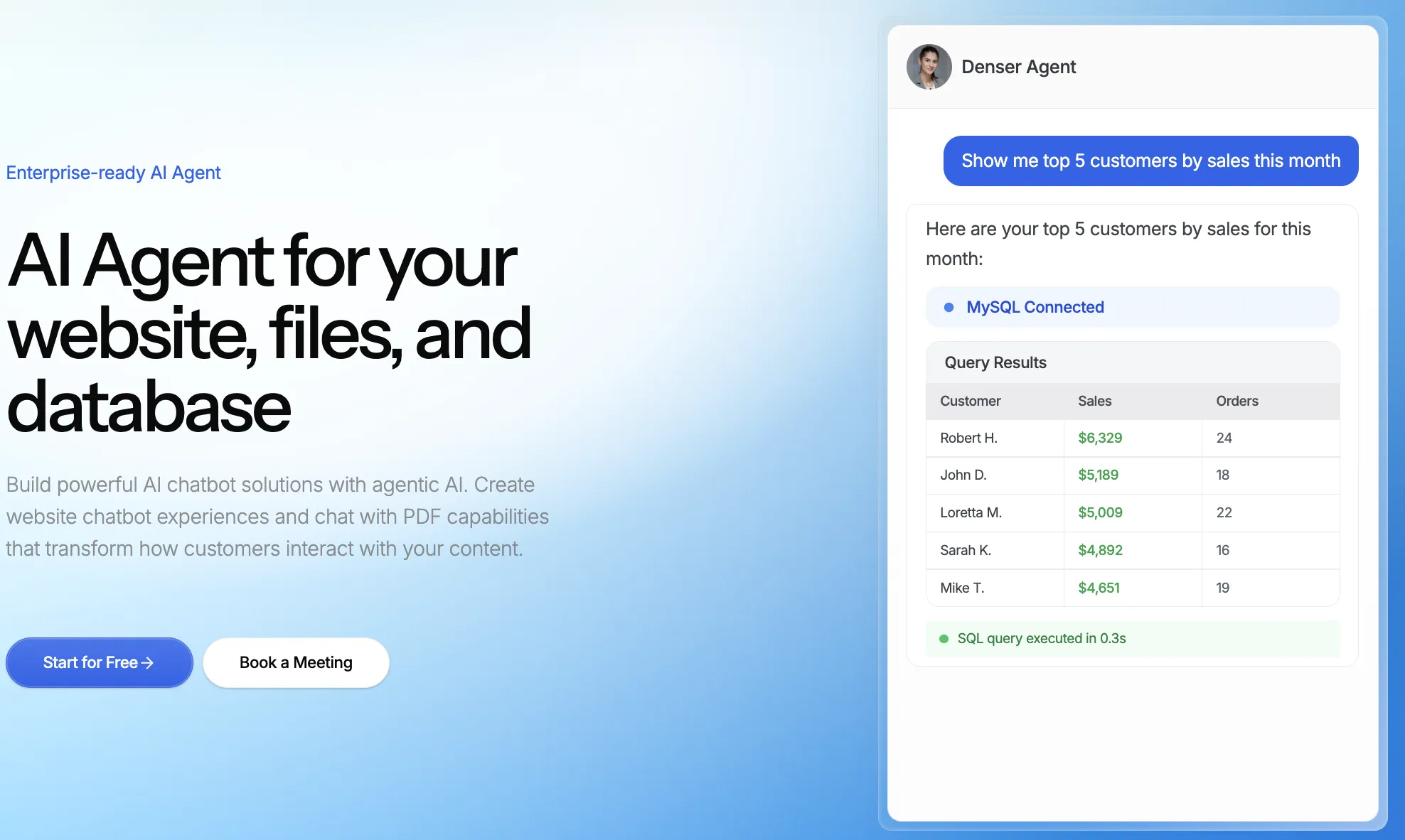
Unlike other chatbots that feel robotic, Denser.ai's semantic AI understands customer questions at a deeper level to ensure every interaction feels personalized and engaging.
Using conversational AI, Denser.ai turns typical website chats into dynamic, engaging conversations that make customer interactions more interactive.
It answers customers' questions while capturing valuable visitor information to improve customer experience.
This powerful AI chatbot builder integrates with your existing systems using robust APIs without disrupting your workflows. Its file-sharing capability also allows users to exchange documents directly within the chat.
Denser Pricing Plans#
- Free Plan: Provides basic chatbot features, ideal for startups
- Starter Plan: $29 per month, great for individuals or small startups needing essential tools
- Standard Plan: $119 per month, suitable for small teams needing more functionality
- Business Plan: $399 per month, best for larger businesses requiring full features and support
- Enterprise: Custom solutions for large organizations—contact our sales team for tailored pricing and advanced features
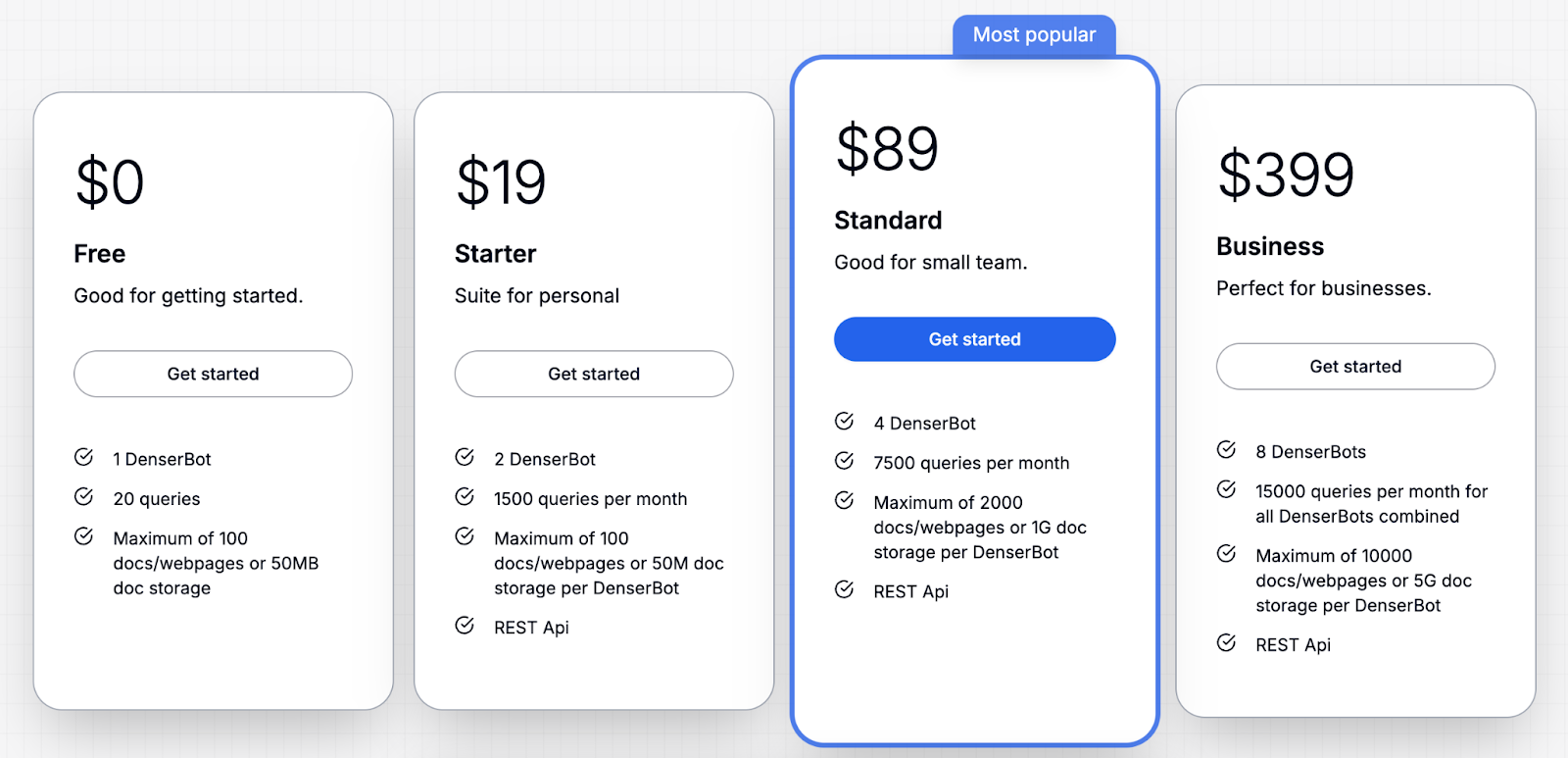
Sign up for a free trial or schedule a demo today.
2. Intercom#
Fin is an AI-powered agent from Intercom that handles complex customer queries and engages in full conversations.
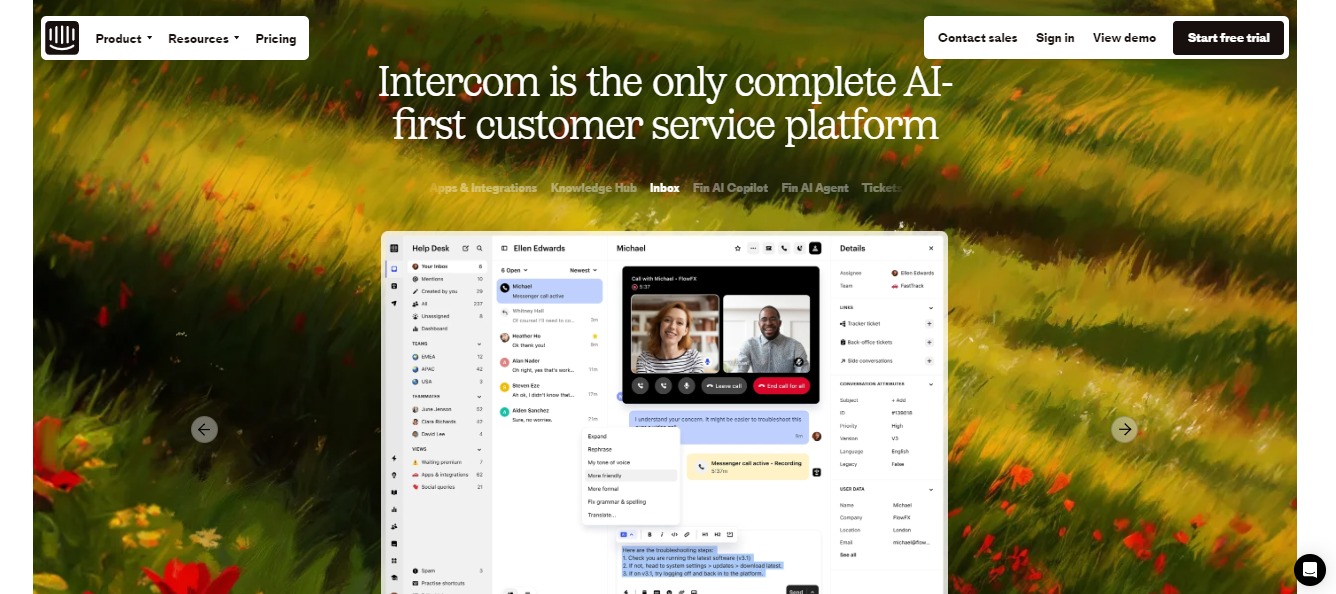
Image Source: Intercom
It can ask clarifying questions and provide accurate responses, creating a smooth user experience.
Fin works with Intercom's platform, including the inbox, ticketing, messenger, and reporting tools, right out of the box.
Pros#
- Easy to manage multiple chats and work with external teams
- Simple, intuitive design
- Easy to assign and track queries
- Flexible app integrations
Cons#
- Managing accounts for support teams can be hard
- The user interface and tutorials need improvement
- Limited conversation filtering options
Pricing#
- Essential: $29 per seat/month for basic tools
- Advanced: $85 per seat/month for improved features
- Expert: $132 per seat/month for full advanced tools
- Fin AI Agent: $0.99 per resolution (pay only when issues are resolved)
- Copilot Add-on: $35 per seat/month for unlimited AI-powered agent assistance
3. Drift#
Drift integrates with your website to provide real-time responses. It can answer customer inquiries, book meetings, or solve issues.
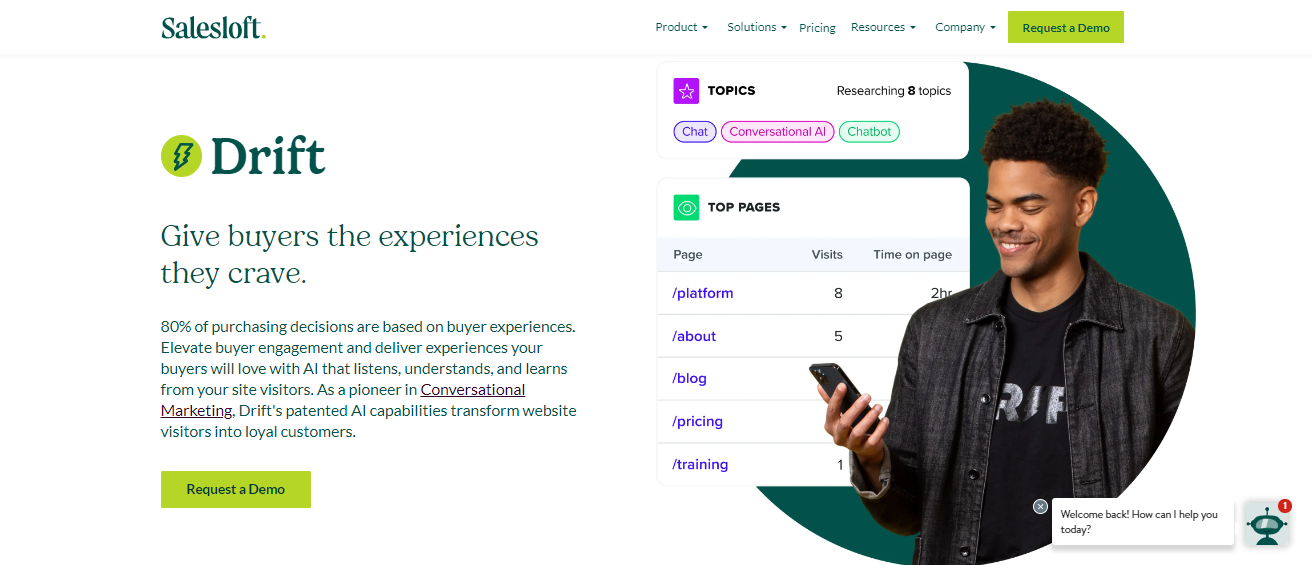
Image Source: Drift
With intelligent chat routing, conversations are quickly directed to the right person or team, which keeps customers engaged in one chat window.
Pros#
- Easy to navigate
- Integrated with top CRM systems
- Engages leads at peak interest on the website
- Increases lead conversion by targeting the right clients
Cons#
- Limited assistance with setup or technical support
- Pricing is not small business-friendly
Pricing#
- Premium: Starting at $2,500/month – designed for small businesses with conversational firepower
- Advanced & Premier: Custom pricing for larger organizations
Note: Drift is now part of Salesloft. Companies using Drift's Bionic Chatbots report 50% more opportunities with 45% fewer meetings. Contact their sales team for current pricing.
4. Tidio#
Tidio's Lyro AI chatbot handles up to 70% of customer inquiries across live channels in multiple languages.
It responds in 6 seconds using your data and communicates naturally. With Live Chat, you can engage visitors, track their browsing, and boost sales with personalized discounts.
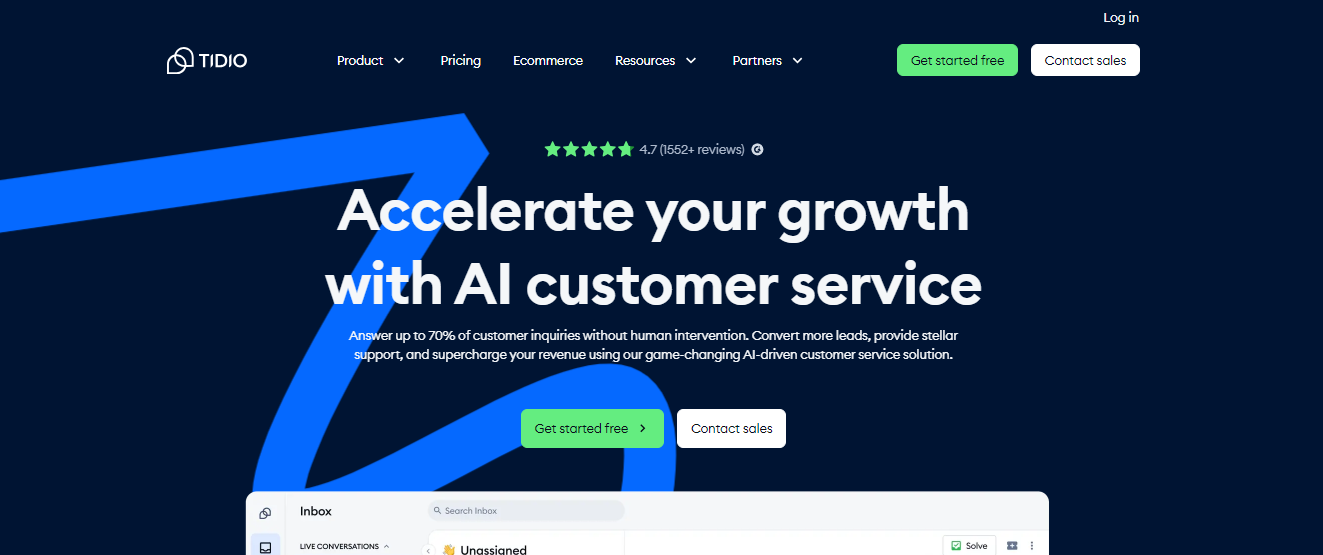
Image Source: Tidio
Pros#
- User-friendly and intuitive design
- Easy to close sales when customers are ready
- Real-time tracking and custom responses
- Live AI chat with browsing customers
Cons#
- Confusing pricing structure
- URL issues sometimes
- Few rewards for loyal users
- Free only up to a visitor limit
Pricing#
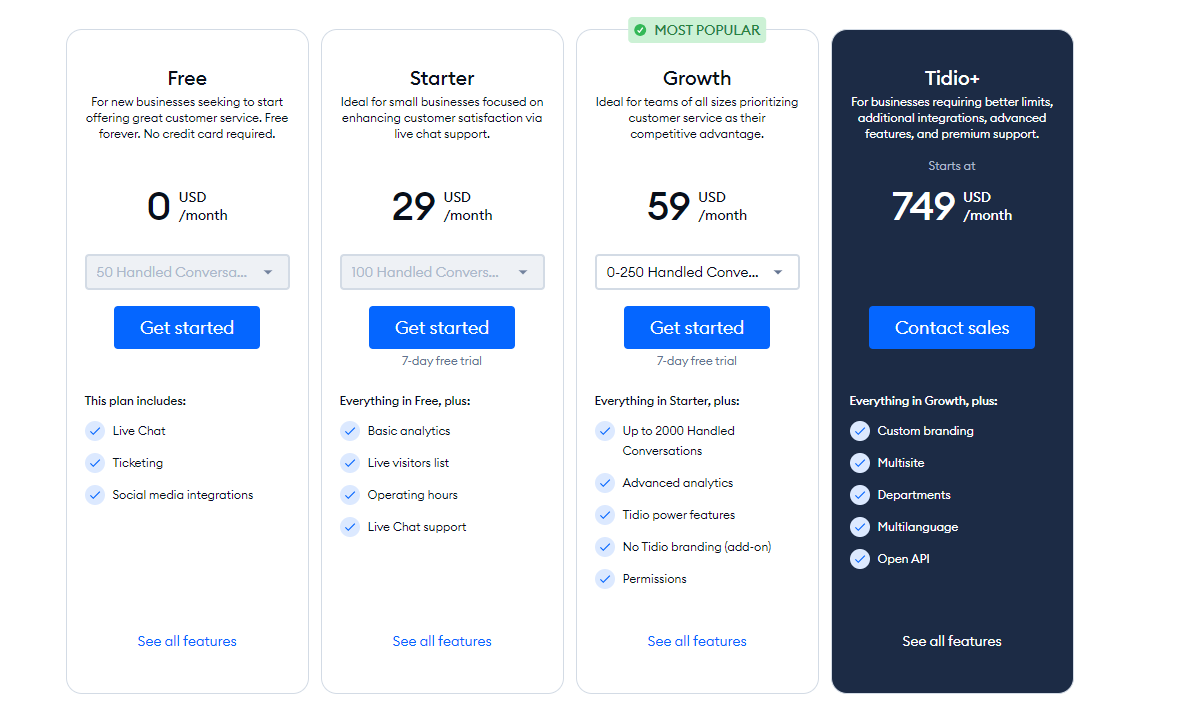
Image Source: Tidio
- Free Plan: $0/month – 50 free Lyro AI conversations (lifetime), essential live chat features
- Lyro AI: Starting at $39/month for 100 AI conversations (~$0.50 per conversation)
- Starter Plan: $29/month – Ideal for small businesses looking to improve customer satisfaction
- Growth Plan: $59/month – Perfect for teams prioritizing excellent customer service
- Tidio+ (Premium): Starting at $749/month – Managed AI with guaranteed resolution rates and 3,000+ AI conversations
5. Chatbot.com#
Chatbot.com integrates your data, website content, and internal documents for an easy setup.
Their AI Assist uses machine learning, natural language processing, and generative AI to build a custom AI model.
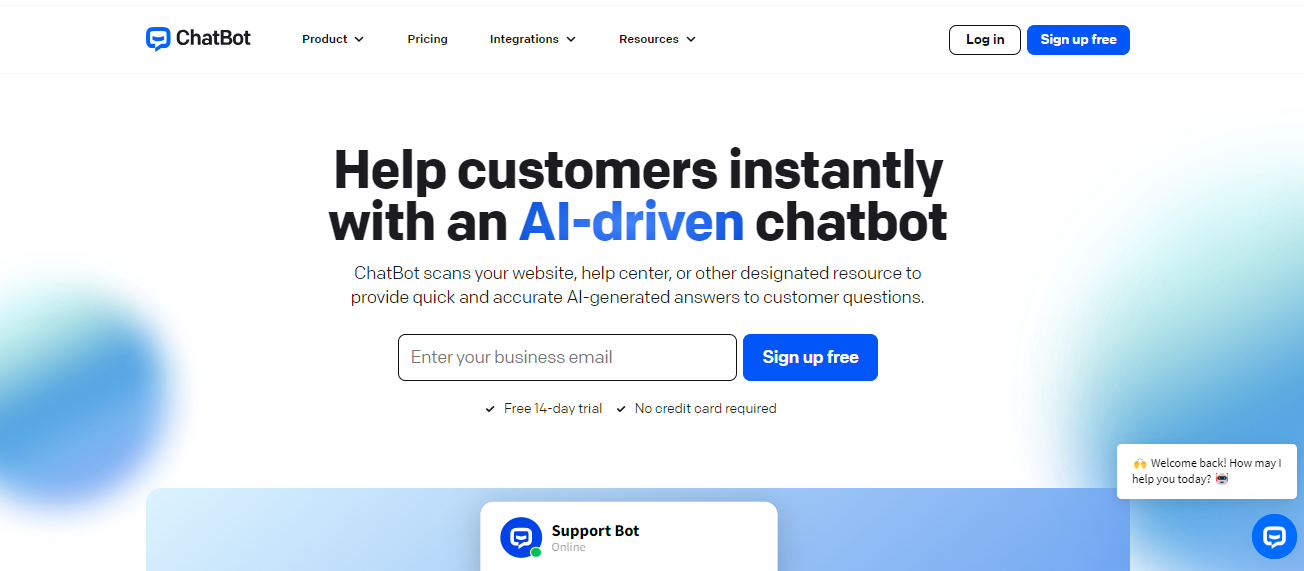
Image Source: ChatBot.com#
Pros#
- Great workflow builder with diverse features
- Strong customization options
- Good API integration with alternatives to CRM systems
- Integrates well with LiveChat
Cons#
- More suited as an entry-level option or add-on for LiveChat
- Manual learning is required, and no AI for ongoing learning during setup
- Limited configuration for bot display to end users
- Often unavailable due to network or server issues
Pricing#
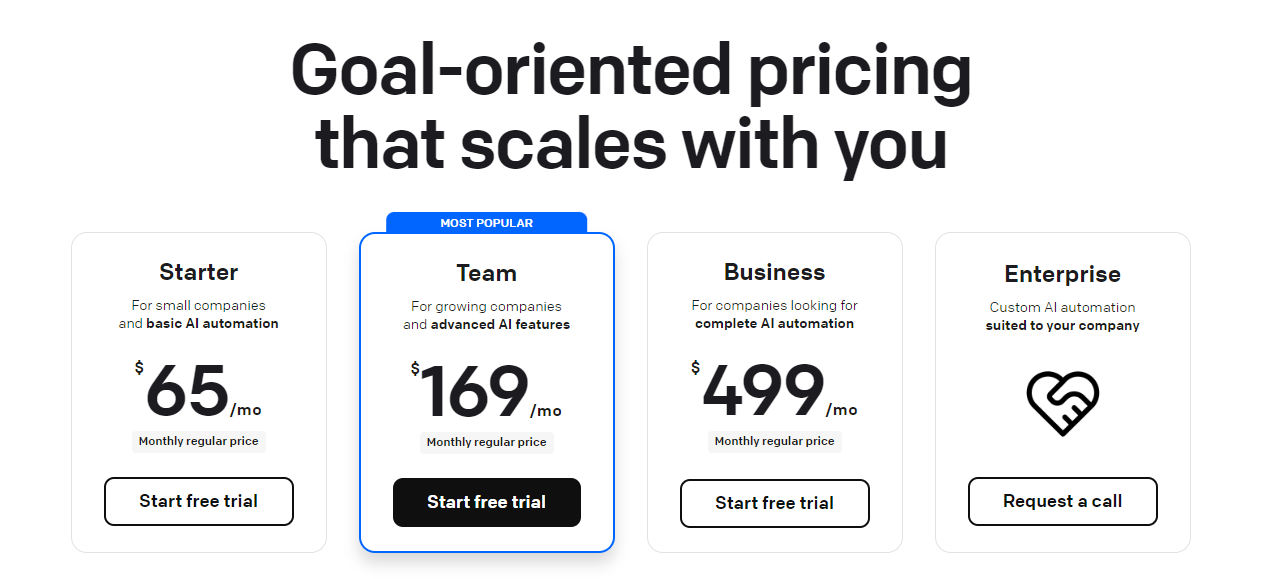
Image Source: ChatBot.com#
- Starter: $65/month – includes set number of free chats, additional chats at $0.05 each
- Team: $169/month – great for growing companies with expanding needs
- Business: $499/month – designed for customer service reps in larger companies
- Enterprise: Custom pricing – tailored solutions for large-scale businesses
Note: Higher-tier plans allow you to remove the "Powered by ChatBot" branding. You can create unlimited chatbots, but active bot limits depend on your plan.
6. ManyChat#
ManyChat's platform helps small businesses connect with prospects and engage customers through chatbots.
It supports campaigns across Messenger, WhatsApp, SMS, websites, and email to easily reach your audience on multiple channels.
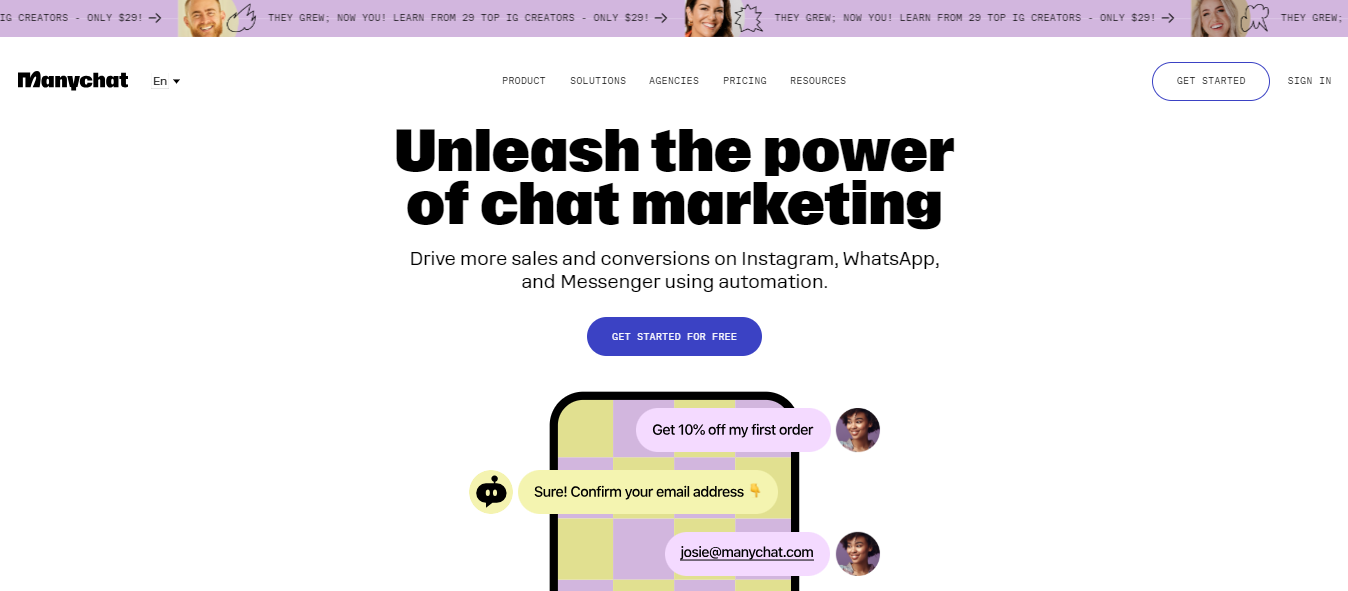
Image Source: ManyChat
Pros#
- User-friendly interface
- Easy-to-use visual flow builder
- Simple setup for automation and sequences on Instagram
- Impressive options for creating chatbots with media and external links
Cons#
- Issues with live chat due to Facebook Messenger API problems
- Limited features for the price of the pro subscription
Pricing#
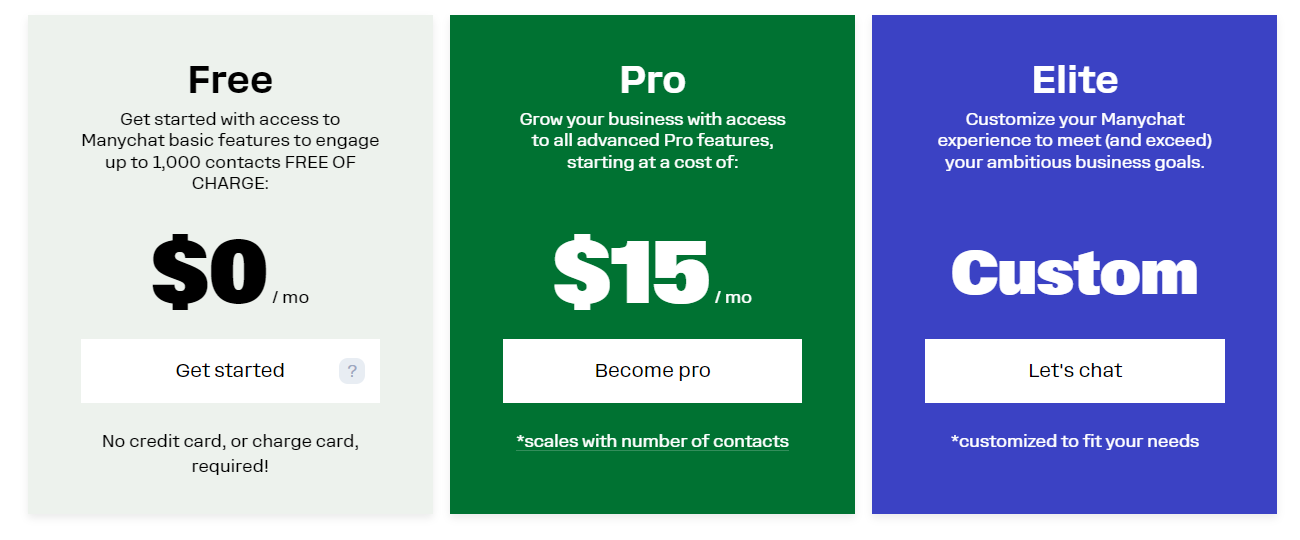
Image Source: ManyChat
- Free: Basic features for up to 1,000 contacts on Facebook, Instagram, and WhatsApp
- Pro: Starting at $15/month for 500 contacts – scales up based on contact volume (up to $8,000+ for 2M contacts)
- AI Add-on: $29/month extra for AI features like AI Step and AI Flow Builder Assistant
- Inbox Pro: Starting at $99/month with 3 live chat seats
- Elite: Custom pricing with dedicated onboarding, customer success manager, and white-labeling
Note: Annual billing offers 25-30% discount. Additional charges apply for WhatsApp, SMS, and Email messages.
7. LivePerson#
LivePerson allows businesses to easily design and manage AI chatbots that automate customer interactions.
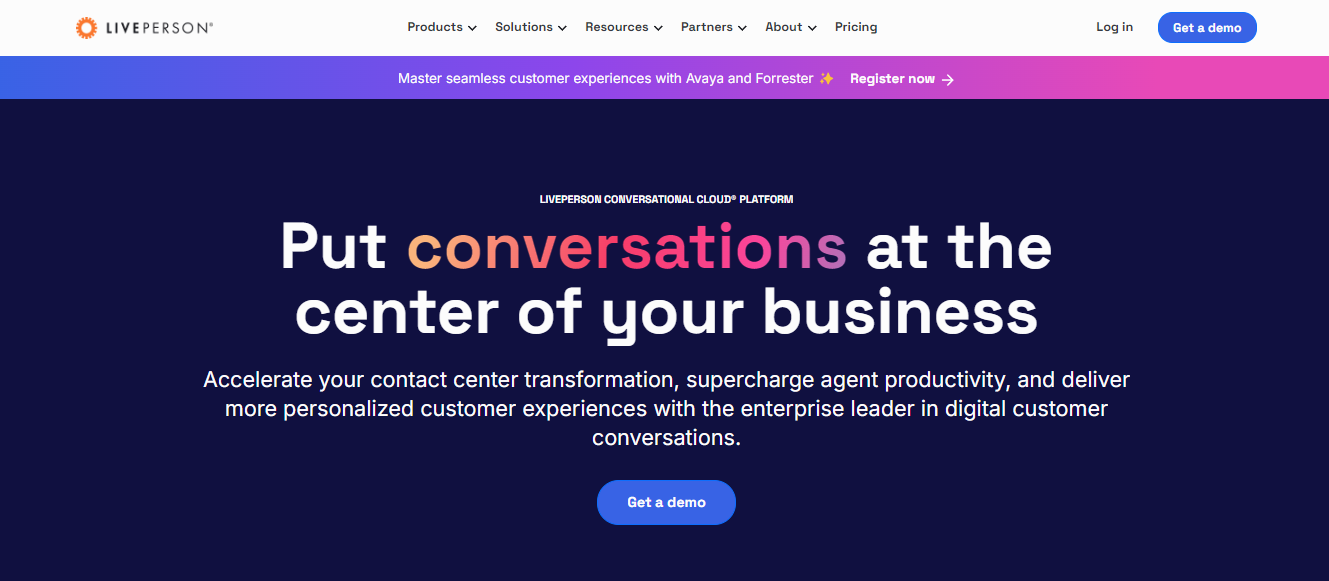
Image Source: LivePerson
Its Generative AI model turns content into engaging conversations. Their Conversational Cloud® integrates key systems and data to offer a complete view of customers for better communication.
Pros#
- Easily integrates with other apps
- Clear view of all incoming chats
- Easy setup for bulk messaging and product tours
Cons#
- Outdated chat window design
- Limited multilingual messaging support
- Some features are hard to find, like time tracking
Pricing#
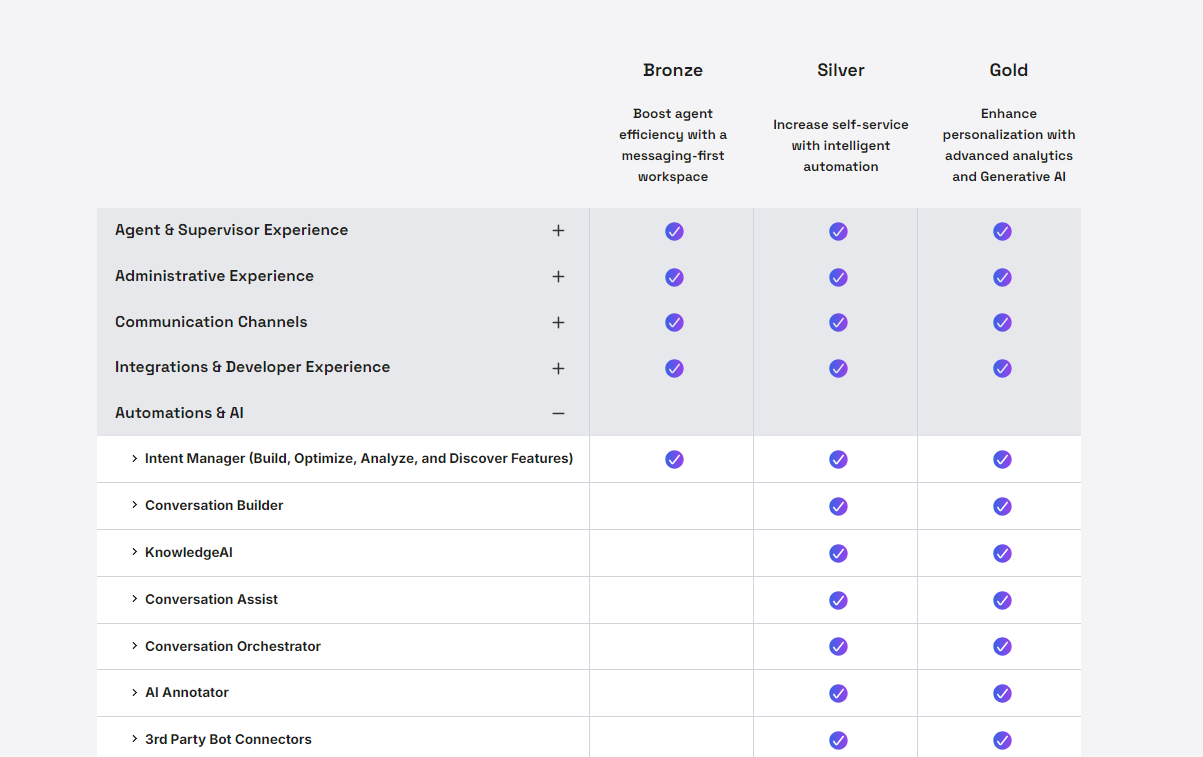
Image Source: LivePerson
- Starting at: $40/month for basic access
- Enterprise: Custom pricing – average annual cost around $61,000 based on industry data
- Bronze, Silver, and Gold tiers available for different business sizes
LivePerson's AI orchestration delivers up to 60% cost savings across voice and digital channels. Contact their sales team for customized pricing based on your automation needs and messaging channels.
8. Freshchat#
Freshchat's Customer Service Suite simplifies support by combining tools, cutting costs, and reducing confusion. It enables easy deployment of AI chatbots across websites, apps, and messaging channels for efficient, consistent customer service.
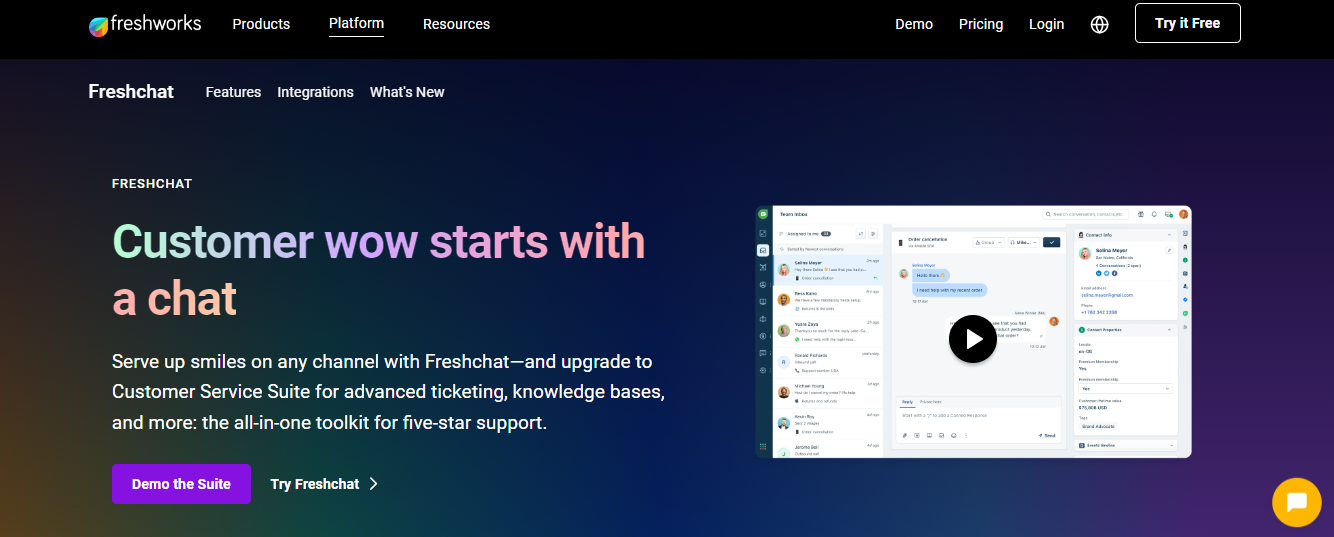
Image Source: Freshworks
Pros#
- Easy to use and navigate the interface
- Unified agent workspace with tools to engage teams
- Direct CRM integration
- Works seamlessly with WhatsApp
Cons#
- Limited customization options for reports
- Pricing could be more affordable
- Occasional bugs and slow loading on Chrome
Pricing#

Image Source: Freshworks
- Free: Free forever for up to 10 agents (no Freddy AI sessions included)
- Growth: $19-23/agent/month – includes 500 Freddy AI Agent sessions and all channels
- Pro: $49-59/agent/month – adds custom dashboards, routing mechanisms, and SLA policies
- Enterprise: $79-95/agent/month – includes skills-based assignments, unlimited campaign contacts, and enhanced security
Note: 21-day free trial available. Add-ons for Freddy Copilot and extra AI sessions available at additional cost. Key 2026 features include Unified Smart Inbox and IntelliAssign 2.0.
9. Chatfuel#
Chatfuel is a no-code platform for building Messenger and Instagram chatbots. It handles over a billion conversations monthly, helping businesses automate customer interactions and improve engagement easily.
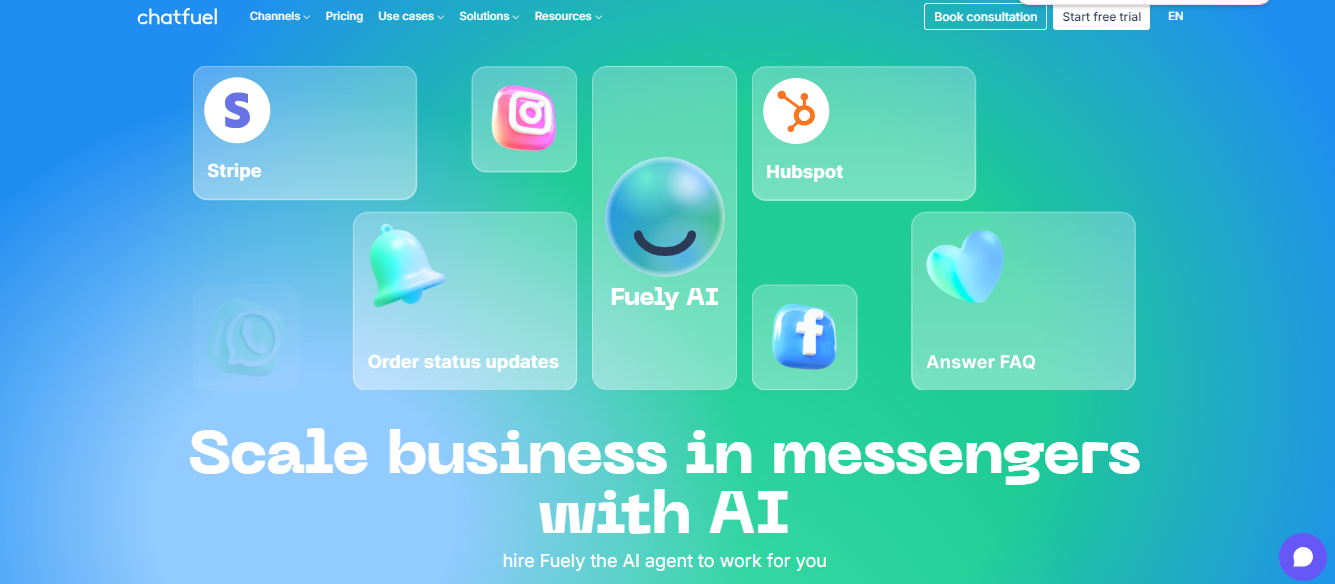
Image Source: Chatfuel
Pros#
- Wide range of features for building complex chatbots
- Active community forums for support
- Help and troubleshooting are available for launching on Messenger.
- Special program for eligible nonprofits
Cons#
- Servers slow down during busy times
- Limited functions can be costly for large businesses
- Challenging to use without a developer
Pricing#
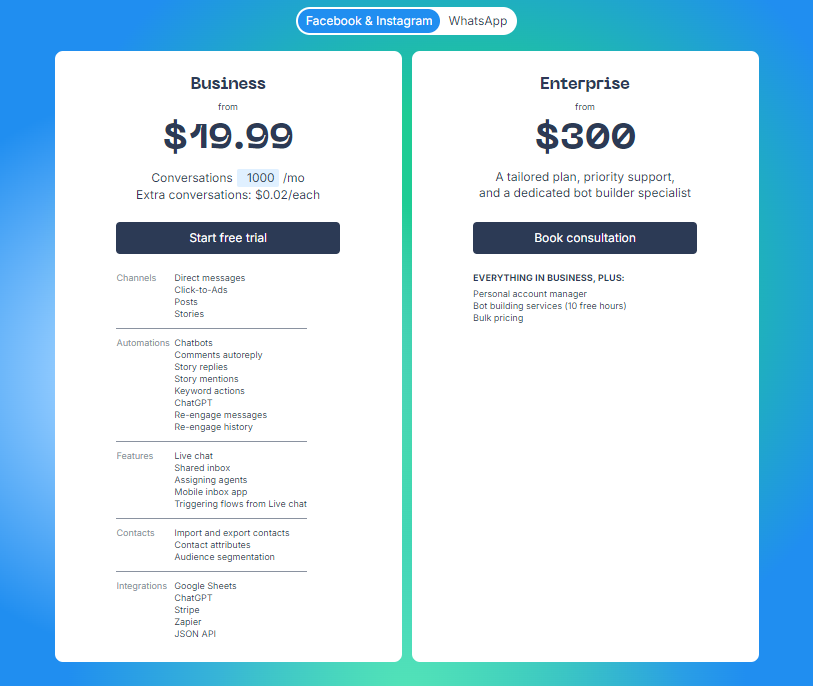
Image Source: Chatfuel
Facebook & Instagram:
- Business: Starting at $20-24/month for 1,000 conversations (scales with usage, e.g., 2,500 conversations at $45/month)
WhatsApp:
- Business: Starting at $34-49/month for 1,000 conversations with full platform features
Enterprise:
- Starting at $300/month for all platforms with advanced features
Note: 7-day free trial available. Chatfuel doesn't merge contacts across channels, and no website chat widget is available.
10. Chatbase#
Chatbase lets you create chatbots customized for support, lead generation, and customer engagement on your website.
You can easily train it using text from emails or messages, and it can crawl your website to find answers to support questions.
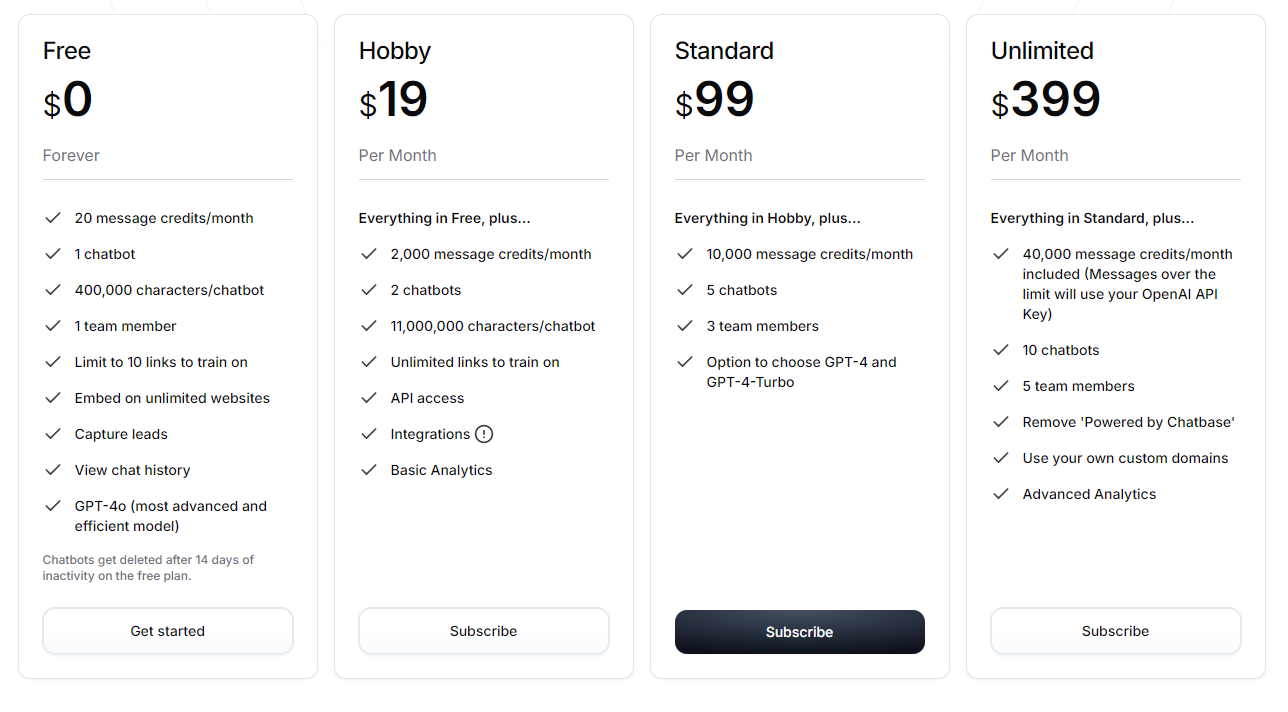
Image Source: Chatbase.co
Pros#
- User-friendly interface
- Easy setup and implementation
- Ability to view conversations with prospective clients
Cons#
- Limited to 11 million characters with no upgrade option
- Needs lots of data for accurate AI responses
- No option to import multiple Q&As; manual entry is needed
Pricing#

Image Source: Chatbase.co
- Free: 50 message credits/month, 1 AI agent – agents deleted after 14 days of inactivity
- Hobby: $40/month for 1,500 credits
- Standard: $150/month for 10,000 credits
- Pro: $500/month for 40,000 credits
- Enterprise: Custom pricing for large-scale operations
Add-ons: Extra credits at $14/1,000, additional AI agents at $7/month each, custom domains at $59/month, remove branding at $39/month.
Note: Credit costs vary by AI model – GPT-4 uses 20 credits/response while Claude 3.5 Sonnet uses only 1 credit/response.
How to Choose the Best Chatbot on Website for Your Business#
Choosing the best chatbot on website for your business requires careful consideration of several key factors. Here's a quick guide to help you make the best choice:
Define Your Needs First#
Different website chatbot platforms offer a range of features, so understanding what you want to achieve will help narrow down the options.
Do you need the chatbot on website primarily for customer support, where it can handle frequently asked questions, troubleshoot common issues, or provide 24/7 assistance?
If so, look for chatbots on website that specialize in providing immediate and accurate responses to reduce the workload for your customer service team.
If lead generation is your focus, you'll want a chatbot for website to collect user information, qualify leads, and schedule appointments or follow-ups with your sales team.
In this case, features like conversation routing and data collection are what you need.
If you need to boost revenue, sales chatbots can assist customers in browsing products or offering personalized recommendations.
In such scenarios, the best option might be a website chatbot that integrates well with your e-commerce platform and can handle transactions or cart recovery.
Evaluate Support Options#
Even the most intuitive chatbots can present challenges during setup or usage. Reliable support can improve how your chatbot integrates with your business operations.
Start by reviewing the types of support available.
Some platforms offer 24/7 live chat or phone support if you need immediate assistance during setup or when technical issues arise. Others may provide email support, which can be slower but effective for less urgent queries.
Additionally, check for self-service resources like tutorials, FAQs, and video guides. These can help troubleshoot common issues on your own.
Platforms with active community forums or user groups can also be a great resource where users share solutions and tips.
Prioritize Customization#
Your chatbot should reflect your brand's voice and tone to meet your customers' specific needs.
A good chatbot allows you to customize how it responds to different queries to ensure it provides helpful, relevant answers.
You should be able to design personalized interactions that guide users based on their behavior or preferences, making the experience more engaging and effective.
Look for chatbots that allow you to modify the visual appearance as well. Your chatbot should match the design of your website or app, from the color scheme and fonts to the layout of the chat window.
Assess the Learning Curve#
Some website chatbot platforms allow you to create and customize chatbots without coding skills, while others might require more technical knowledge.
Start by exploring how user-friendly the platform is. Does it provide drag-and-drop builders for setting up conversation flows?
Platforms like Denser.ai are known for their ease of use, making it simple to build a chatbot on website with just a few lines of code.
This is especially important if you want to frequently update or adjust your chatbot for website without relying on external developers. The platform also offers tutorials, documentation, or onboarding guides to help you get started.
Consider Long-Term Scalability#
As your website gains more visitors, the chatbot on website should be able to handle more customer interactions simultaneously without affecting performance.
For instance, you may initially use the website chatbot for basic customer support but later need it to handle more complex tasks such as lead generation.
You must choose a platform that offers advanced features like AI integration, machine learning, and multi-channel support, which can be activated as your business grows.
If you plan to expand your business across additional platforms such as social media, messaging apps, or mobile apps, ensure the chatbot for website can integrate with these channels as needed.
Look at Pricing Structures#
Different website chatbot platforms offer various pricing models, so it's important to understand which structure aligns with your business needs.
Many chatbot on website providers, such as Denser, offer a basic free version that allows you to test their features before committing to a paid plan.
Consider whether the chatbot provider offers scalable pricing tiers. This ensures that you can upgrade to a plan or advanced features as your business grows without being locked into a rigid payment structure.
Power Up Your Website Interactions with Denser.ai#
With Denser.ai, you can transform how you connect with your customers. This powerful chatbot on website delivers quick, personalized responses, giving customers the fast, accurate support they expect.
Beyond answering questions, this website chatbot platform helps turn conversations into sales while integrating with your existing systems.
If you're ready to make your website more engaging and interactive, Denser.ai is the best chatbot for website solution to boost your customer communication and experience.
Setting up a chat widget with Denser.ai is fast and easy—just add a small code snippet, and you're good to go.

Sign up for a free trial or schedule a demo now.
FAQs About Chatbot on Website#
How does a chatbot on website handle customer feedback?#
A website chatbot can be programmed to request and collect customer feedback at the end of a conversation. Chatbots on website can ask users to rate their experience, leave comments, or answer survey questions, providing valuable insights into customer satisfaction and areas for improvement.
Do website chatbots require regular updates?#
Yes, like any other software, a chatbot on website benefits from regular updates to improve functionality, adapt to new user behaviors, and fix bugs.
Additionally, AI-powered chatbots should be continuously trained with new data to enhance their performance and keep up with changing customer needs.
Can a chatbot for website help with employee onboarding or training?#
A chatbot for website can assist with employee onboarding and training by providing new hires with information, answering frequently asked questions, and guiding them through training materials. This reduces the workload for HR teams and ensures that employees receive consistent, on-demand support.
What is the best chatbot on website for small businesses?#
For small businesses, the best chatbot on website should be affordable, easy to set up, and offer essential features like 24/7 customer support, lead capture, and basic integrations. Platforms like Denser.ai offer free plans with scalable pricing, making them ideal for small businesses looking to implement a website chatbot without significant upfront costs.
How much does a website chatbot cost?#
Website chatbot pricing varies widely depending on features and scale. Basic plans start around $15-40/month, while enterprise solutions can range from $500-$2,500/month or more. Many chatbot on website providers now use credit-based or per-resolution pricing models (e.g., $0.50-$0.99 per conversation). Most platforms offer free trials or limited free plans, allowing you to test before committing.
